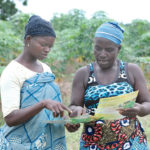Bẹrẹ festival is one of the most common festivals in the earliest times in Oyo Alaafin. Bẹrẹ festival takes place in January and February, towards the end of the traditional year, the New Year commencing in March.
Bẹrẹ festival is a national festival in Oyo, in that it brings together all Oyo speaking people as members of the same family, with the Alaafin of Oyo being the head. It is primarily the harvest home festival, symbolised by ceremoniously setting the fields on fire to indicate that it has been cleared of the fruits of the earth.
It is an important one at Oyo, not only because it closes the civil year, but also because by it, the king numbers the years of his reign.
The Bẹrẹ (Anadelphia Arrecta) is the commonest grass in savanna and it grows only in the plain country and was solely used for thatching houses.
The ceremony known by that name (Bẹrẹ) became an annual festival as a result of the need to re-thatch Alaafin’s palace annually. During the festival, people from all over the Oyo Empire had to come to Oyo with bundles of Bẹrẹ grass and other gifts to be presented to Alaafin. The latter also received gifts from the Oba of the Ekiti, Ijesa, Egba and the Ife Kingdoms. The gifts can be interpreted as tributes or taxes.
The ceremonial cutting of grass during Bẹrẹ festival is known as Pakudirin. The ritual is performed by the palace officials who are of slave origin. The ceremony entails the presentation of the grass to Sango, the national deity in Oyo. Until the ceremony is performed, no one could cut grass for thatching or other purposes and in case the ceremony was not performed before the early rain, no one could make use of the grass any more. In fact, Alaafin himself must not use the Bẹrẹ grass to cover his palace until pakudirin is performed.
However, since the Alaafin is regarded as the representative of Sango on earth, he should use the grass first before any of his subjects. Hence, Oyo people had to re-thatch Alaafin’s palace before rethatching theirs. The pakudirin is performed by Ona-‘wefa or chiefs of the eunuchs, by the Basorun or his representative and the Ab’obaku or master of the horse. The King is supposed not to have seen the new Bẹrẹ grass of the year, Ona-‘wefa first step forward before him with a scythe made of brass or copper, performing in the air a mimic act of mowing the grass and one of the ladies deputed for the purpose, extending her wrap as it were, to receive the same hugging it as something precious. This is done two or three times, the Basorun then follows and goes through the same forms and then the master of the horse. Each of these chiefs now makes a short speech congratulating the King on the advent of a new year wishing him long life and a prosperous reign.
After this, about half-a-dozen men with small bundles of the Bẹrẹ grass neatly done up, enter the palace with measured steps to the sound of music and come dancing before the King in front of the Aganju. His majesty is supposed to see the grass now for the first time that year. The pakudirin festival is brought to a close by presents given to the men and then all spectators disperse.
The Jelepa is the ceremony of setting the field on fire. This is performed by the Basorun outside the city walls. Booths and enclosures of palm leaves, having been erected for the purpose, the Basorun with a princely train repair thither on the day appointed, where he is met there by a number of women from the palace bringing a large calabash draped with a white cloth and containing-Ekuru and Eko. His supernal Highness first offers a morsel of this in sacrifice as a harvest thank offering for the Yoruba nation after which both himself and those with him partake of the rest accompanied with palm wine or beer made from guinea corn thanking God for blessings of the field. After that, he orders the field to be set on fire but if by an accident the field has already been fired, a bundle of dry grass brought from home is used instead, for the purpose of the ceremony.On the evening of the same day, the king worships the Ogun which is a preliminary to every annual festival.
Each man brings gifts according to his ranks and position and so on to the lowest grades. But the whole of Bẹrẹ first send theirs to the King, the Basorun alone would send about 200 bundles. It is usual to see loads of Bẹrẹ passing to and fro all over the town the whole day. Others that pay tributes of Bẹrẹ come to Oyo later on e.g Aseyin of Iseyin, Oluwo of Iwo, the Bale of Ogbomoso and other cities of the plain where the Bẹrẹ grows.
The festival is concluded by a few Ilaris carrying sacrifices to certain quarters in the outskirts of the city in a state of perfect nudity, there is always a rush of the women clearing out of their way, on the approach of them; the performance being symbolic of some religious rite. If it is violated by any show of natural excitement, it must be atoned for, and there is but one penalty, viz., decapacitation. But there is no record of any such case occurring within living memory. Their rewards after return is being properly dressed, they are admitted into the King’s presence, who, sitting in state, receives them with marks of honour.
The last stage is “Touching the grass”. About 5.30pm on a day appointed, the King’s order from the palace is accompanied by his slaves who have been engaged in piling into two or three heaps the bundles of Bẹrẹ grass. His majesty now steps forward and lays both hands upon each of the heaps, making a short speech invoking blessings on the Yoruba nation, congratulating himself for being spared to see another year. This brings the Bẹrẹ festival to a close.
- Ajekigbe is of the National Museum, Oyo, Oyo State.
WATCH TOP VIDEOS FROM NIGERIAN TRIBUNE TV
- Let’s Talk About SELF-AWARENESS
- Is Your Confidence Mistaken for Pride? Let’s talk about it
- Is Etiquette About Perfection…Or Just Not Being Rude?
- Top Psychologist Reveal 3 Signs You’re Struggling With Imposter Syndrome
- Do You Pick Up Work-Related Calls at Midnight or Never? Let’s Talk About Boundaries






